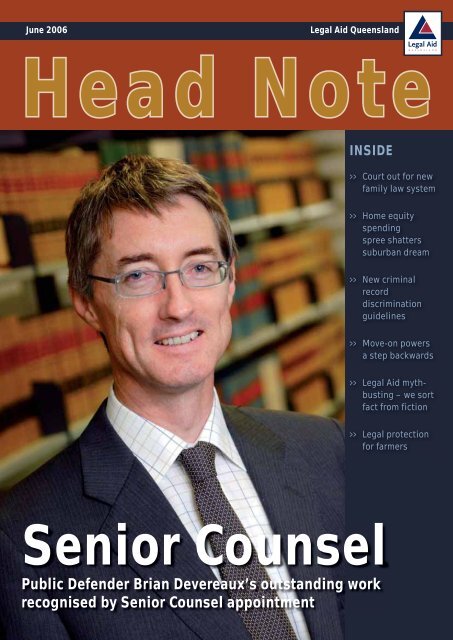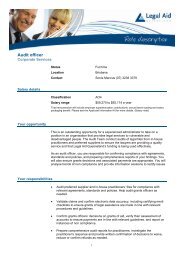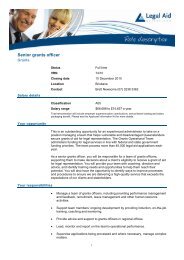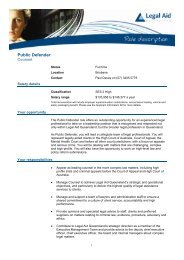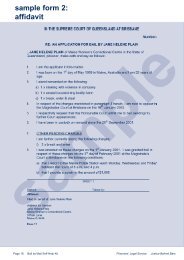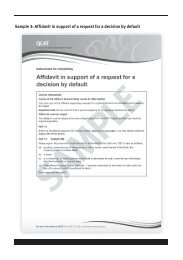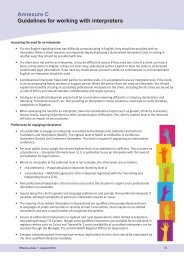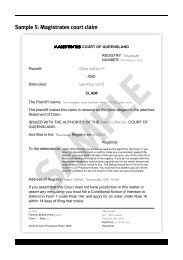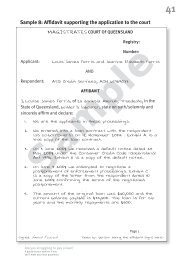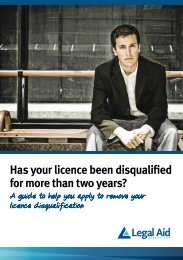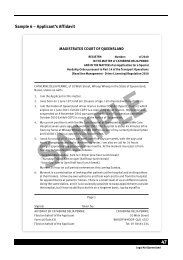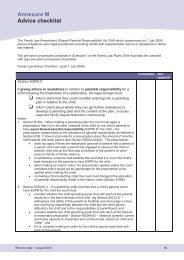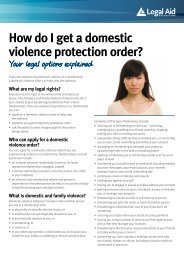Complete issue - Legal Aid Queensland - Queensland Government
Complete issue - Legal Aid Queensland - Queensland Government
Complete issue - Legal Aid Queensland - Queensland Government
- No tags were found...
Create successful ePaper yourself
Turn your PDF publications into a flip-book with our unique Google optimized e-Paper software.
June 2006<strong>Legal</strong> <strong>Aid</strong> <strong>Queensland</strong>Head NoteINSIDE>> Court out for newfamily law system>> Home equityspendingspree shatterssuburban dream>> New criminalrecorddiscriminationguidelines>> Move-on powersa step backwards>> <strong>Legal</strong> <strong>Aid</strong> mythbusting– we sortfact from fiction>> <strong>Legal</strong> protectionfor farmersSenior CounselPublic Defender Brian Devereaux’s outstanding workrecognised by Senior Counsel appointment
ContentsCover – Public Defender appointed to SC 8Public Defender Brian Devereaux’s appointment as SeniorCounsel recognises his extensive skills and expertise as one of<strong>Queensland</strong>’s leading barristers.News 3-5• CEO appointed Magistrate• Cyclone victims helped by free legal advice• <strong>Legal</strong> <strong>Aid</strong> <strong>Queensland</strong> takes home a 2005 Premier’s Award• Addressing the looming skills shortageCourt out for new family law system 10Nicky Davies, <strong>Legal</strong> <strong>Aid</strong> <strong>Queensland</strong>’s Senior <strong>Legal</strong> Consultant,Family Law explains the new wide sweeping family lawreforms.The genuine article 11The journey of <strong>Legal</strong> <strong>Aid</strong> <strong>Queensland</strong>’s two newest article clerks- from university to admitted legal practitioners.Sentenced to discrimination for life? 14Yasmin Gunn, <strong>Legal</strong> <strong>Aid</strong> <strong>Queensland</strong>’s anti-discriminationofficer looks at the protection available to job seekers withcriminal records.Move-on powers a step backwards 16Extended police move-on powers currently before StateParliament have come under criticism for their potential toimpinge on fundamental civil rights - Warren Strange, <strong>Legal</strong><strong>Aid</strong> <strong>Queensland</strong>’s senior legal consultant takes a hard look atthe proposed new police powers.<strong>Legal</strong> aid for civil law claims? 18The process of claiming compensation for a personal injury ornegligence is made easier thanks to a scheme run by <strong>Legal</strong> <strong>Aid</strong><strong>Queensland</strong> and funded by the Public Trustee.<strong>Legal</strong> <strong>Aid</strong> ‘myth-busting’ 20To help people get the most from legal aid services, JaniceHawes, one of <strong>Legal</strong> <strong>Aid</strong> <strong>Queensland</strong>’s customer service centre’scoordinators and trainers, sets the record straight aboutcommon <strong>Legal</strong> <strong>Aid</strong> <strong>Queensland</strong> myths.<strong>Legal</strong> protection for farmers 22<strong>Legal</strong> <strong>Aid</strong> <strong>Queensland</strong>’s Farm and Rural <strong>Legal</strong> Service saysfarmers facing financial problems should seek legal help ratherthan going it alone against banks and creditors.Young and in trouble – what happens next? 23If you’re young and trouble, chances are you don’t know yourlegal rights. As Kerry Bichel, acting youth advocate explains,young people who are criminal suspects need to know theirlegal rights.Keep up with the latest <strong>Legal</strong> <strong>Aid</strong> <strong>Queensland</strong> news online atwww.legalaid.qld.gov.au2 >> Head Note June 2006From theCEO’s desk...IT is with a mix of excitement and sadness that I writethis column – my last as CEO of <strong>Legal</strong> <strong>Aid</strong> <strong>Queensland</strong>.After nearly 30 years in the legal aid system and 16years as CEO, I have recently been appointed to theMagistracy and will be sitting behind the bench in theCairns Magistrates Court from May.Being appointed to the Magistracy is a real honourand I’m excited about beginning a new phase in mycareer and starting a new adventure in Cairns. I alwaysintended to get back to doing court appearances atsome point, but never really imagined it would be onthe other side of the bench.I have always seen the Magistrates Court as “thepeople’s court” and I’m looking forward to meeting thischallenge on behalf of the people of Cairns.But there is also a tinge of sadness in farewellingmy legal aid friends and colleagues who I’ve workedalongside for nearly three decades.I have had the pleasure of working with manyoutstanding people during my time as a solicitor and asCEO. I’d like to thank everyone for their commitment todelivering services to the disadvantaged and for theirdedication to principles of social justice and a fair go.Things have changed so much over the last 25years – we’ve gone from paper files and telephoneswitchboards, to high-tech computer databases,call centres and internet-based service delivery.We’ve grown from 60 staff to a team of more than350 professional and administrative employees. Ourbudget has increased from $6 million to around $70million. And we are now assisting around 250,000<strong>Queensland</strong>ers each year with legal information, adviceand representation.As an organisation, we’ve been through the toughtimes too, including a number of dramatic funding cuts.But we’ve proven to be resilient in recovering from suchset backs and resourceful in our use of public funds.I know <strong>Legal</strong> <strong>Aid</strong> will go from strength to strength inthe coming years, as everyone continues to build on thestrong foundation that is already in place.I’d like to wish acting CEO Graham Quinlivanand our Board members every success as theycontinue to mould and guide this organisationinto the future.Although my time with <strong>Legal</strong> <strong>Aid</strong> <strong>Queensland</strong>has come to an end, this is not a finalgoodbye. I won’t be a stranger, I won’t bea critic, but I will remain a friend.Adios!John HodginsHead Note produced by <strong>Legal</strong> <strong>Aid</strong> <strong>Queensland</strong> | GPO Box 2449 | Brisbane QLD 4001Editor Miranda Greer | email: mgreer@legalaid.qld.gov.au | tel: 07 3238 3004Circulation and distribution 1,500 copies distributed throughout <strong>Queensland</strong> twice yearly
NewsYouth advocateheads to newrole at TIOCyclone victims helpedby free legal adviceA TEAM of <strong>Legal</strong> <strong>Aid</strong> <strong>Queensland</strong>lawyers have visited cyclonedevastated north <strong>Queensland</strong>communities and provided a freemobile advice service to helppeople sort out legal problems thathave emerged since the disaster.Cairns senior solicitor Trish Pricesaid the legal advice team wasmainly asked to assist with legalproblems relating to insurance,tenancy, debt and employment.“We were also asked to answerother legal questions as well,including family law <strong>issue</strong>s andconsumer complaints,” Ms Pricesaid.Ms Price said she and herteam had found the extent of thedestruction and impact on people’slives from economic to emotionalwellbeing hard to comprehend.“Everyone in these communitieshas been through so much… wewere thankful that we had theopportunity to help via the mobilelegal advice service.”The service was provided dailyin Innisfail for a week and on a oneoffbasis in the towns of Babinda,Atherton and Tully.Although the mobile adviceservice represented an emergencylegal response and has now ended,Ms Price said people in north<strong>Queensland</strong> communities could stillcall <strong>Legal</strong> <strong>Aid</strong> <strong>Queensland</strong> for freelegal information and advice.“We can provide further legaladvice and we can also refer peopleto other specialist organisationsthat can also help,” Ms Price said.“For example we had quite a fewpeople come to us with tenancy<strong>issue</strong>s who we provided legaladvice to.“But we can also assist byidentifying organisations like theResidential Tenancies Authority andthe Tenant’s Union and providingtheir contact details.”AFTER 10 years with <strong>Legal</strong> <strong>Aid</strong><strong>Queensland</strong>, inaugural youthadvocate Simon Cleary has movedsouth to take-up a new role asthe Deputy TelecommunicationsIndustry Ombudsman.Simon started his new job at theTIO, which is based in Melbourne,in February 2006.People with inquiries about<strong>Legal</strong> <strong>Aid</strong>’s services for youngpeople can contact Youth Strategyproject officer Linda Richards on3238 3917 or email lrichard@legalaid.qld.gov.au, or contactYouth <strong>Legal</strong> <strong>Aid</strong> on 1300 65 11 88.Updatedpublicationson the wayLEGAL <strong>Aid</strong> <strong>Queensland</strong>’s range ofnew look, rewritten publicationsis currently in production and willsoon be available to order or viewonline at www.legalaid.qld.gov.auThe new publications have beencompletely rewritten to make themeasier to read and use. The selfhelpkits have been transformedinto a handy A5 format, whichcan easily fit into a carry bag orhandbag. The self-help kits havealso received a name change andwill be known as “guides”.The first three publications tobe rewritten and redesigned are:The Small Claims Tribunal – aconsumer guide; Have you beencharged with a criminal offence?A guide to appearing in theMagistrates Court; Have you beenin a motor vehicle accident? Aguide to help you sort out whopays for the damage.<strong>Legal</strong> <strong>Aid</strong> <strong>Queensland</strong>’s lettershave also been revised andrevamped to make them easier toread and understand.>> Head Note June 20063
New board members to help guide<strong>Legal</strong> <strong>Aid</strong>’s strategic directionLEGAL <strong>Aid</strong> <strong>Queensland</strong>’s board has a new chairpersonand three new members with Iyla Davies, Vince Knauthand Tony Rafter SC, joining Zoe Rathus and MargO’Donnell in guiding <strong>Legal</strong> <strong>Aid</strong>’s strategic direction.Marg O’Donnell, who has been a board membersince November 2004, was appointed as chairperson inSeptember 2005.Ms O’Donnell is a former Director-General of three<strong>Queensland</strong> <strong>Government</strong> departments: Equity andFair Trading, Aboriginal and Torres Strait IslanderPolicy and Development, and the Arts. She wasVictoria’s first <strong>Legal</strong> Ombudsman and establishedand ran the Alternative Dispute Resolution Divisionin the Department of Attorney-General and Justice in<strong>Queensland</strong>.Ms O’Donnell is Chair of the Visiting Committeefor the Law School at Griffith University and is also afreelance consultant. She contributes her expertise to anumber of boards.Iyla Davies has been a member of the board sinceJune 2005 and is currently a senior lecturer in the LawFaculty at QUT. She coordinates the undergraduatefamily law program and the postgraduate mediationprogram. She is also currently the National President ofRelationships Australia.Ms Davies has previously served on communityservice committees including the SpecialistAccreditation Board of the <strong>Queensland</strong> Law Society,Lawyers Engaged in Alternative Dispute Resolution andthe Australasian Law Teachers Association.Chartered accountant Vince Knauth has broughtexpertise in economics, commerce and businessmanage ment to the Board since his appointment in July2005.Mr Knauth, who spent nearly three decades workingin the aviation industry as an air traffic controller,began his own chartered accounting practice in 1989,specialising in business taxation, superannuation andtrust account auditing.Tony Rafter SC is the most recent addition to theBoard, taking up his position in January 2006.Mr Rafter is a criminal law barrister working mainlyin appellate cases before the Court of Appeal and HighCourt.Admitted to the bar in 1985 and appointed SeniorCounsel in 2003, Mr Rafter recently oversaw the<strong>Queensland</strong> Thoroughbred Racing Commission ofInquiry.CEO appointedto MagistracyAFTER 29 years with <strong>Legal</strong> <strong>Aid</strong>, longservingCEO John Hodgins is set totake-on a new challenge.Mr Hodgins was appointed tothe Magistracy by Attorney-GeneralLinda Lavarch on March 23 and willsit behind the bench for the firsttime in the Cairns Magistrates Courton May 2.Mr Hodgins began his careerwith <strong>Legal</strong> <strong>Aid</strong> in 1977, working forthe Australian <strong>Legal</strong> <strong>Aid</strong> Office,which later merged with the <strong>Legal</strong>Assistance Committee to form the<strong>Legal</strong> <strong>Aid</strong> Office (<strong>Queensland</strong>).He worked as a family lawyerbefore being appointed to theposition of Assistant Director,Referrals (now Grants) in 1982 andlater headed-up the family lawpractice.Mr Hodgins became CEO in1990, following the resignationof Barry Smith who had lead theorganisation for 10 years.Mr Hodgins said he was lookingforward to the challenge of theMagistracy and serving the peopleof Cairns through his new role.“I’ve had nearly three decadeswith <strong>Legal</strong> <strong>Aid</strong> and I’m really proudof what we’ve achieved together asan organisation,” he said.“I’m happy to say that I’ll beleaving the organisation in goodshape, we’ve got great staff,talented up-and-coming managersand importantly, a real dedicationto social justice and helpingdisadvantaged people accessjustice.“I’m excited about becoming aMagistrate, particularly because I’llbe working in the court that has themost interaction with the public. Inthat way, I’ll be helping and servingthe people of Cairns, which is a realhonour.”Graham Quinlivan, who managesthe organisation’s legal practice,will be acting CEO.4 >> Head Note June 2006
Raising the barto let women inMost law graduates are female, but few reach the top. Leanne Edmistoneand Amanda Watt from The Courier-Mail report on the lack of womenappearing before our highest courts and meet two <strong>Legal</strong> <strong>Aid</strong> <strong>Queensland</strong>barristers who are balancing work and family commitments to enhanceaccess to justice.ONE of Australia’s most senior judges has reignited thelegal gender debate, calling for practical solutions totame the “aggressively male environment” that hindersthe advancement of female barristers.High Court of Australia Justice Michael Kirby, AC,used the inaugural Dame Ann Ebsworth Memoriallecture, held in London recently, to decry the slowprogression of women in the law, particularly in terms ofappearances before the country’s highest courts.Justice Kirby said cultural and processional attitudesin legal circles were to blame, particularly the prevailingmasculine cultures of the Bar and difficulties inbalancing family and professional responsibilities.“These elements combine to produce a sometimesaggressively male environment in which it is not entirelysurprising to find a lack of women,” he said.Justice Kirby said while women account for morethan half of graduating law students nationally andthe number of legal practitioners admitted, they weresignificantly under-represented at the higher levels ofthe profession and in appearances in the High Court.In <strong>Queensland</strong>, there were 259 women registeredto the Bar, compared with 1340 male barristers. Ina membership of about 7000, the <strong>Queensland</strong> LawSociety has 65 percent male solicitors and 35 percentfemale solicitors. But since 2000, more women havebeen admitted each year than men.Statistics compiled by the Registry of the High Courtof Australia reported that in 2004, 788 men appearedas counsel compared with 58 women. In 2005, thosefigures rose to 1504 male counsel and 197 femalecounsel appearing.Justice Kirby said gender disparity had significantimplications for the public confidence in the judiciary,the way cases were viewed in court, the way courts wereperceived and for the unique perception women bringto cases involving other vulnerable groups in society.He also said if the number of women appearing asadvocates before the most senior courts continued tobe low, it was likely they would continue to be underrepresentedin judicial appointments.“Here we are in the 21st century still talking aboutthe need for women to just wait patiently for equalopportunity to become a reality in advocacy in ourcourts,” Justice Kirby said.“Given the importance of our legal systems to thedevelopment of a fair and just society, it is critical thatthe best and brightest are encouraged to take up theprofession of law.”Justice Kirby said there was no easy solution toensure equal opportunities for women as advocates,but the culture at the Bar had to be modified to make ita more welcoming environment.“Here we are in the 21st century stilltalking about the need for womento just wait patiently for equalopportunity to become a reality inadvocacy in our courts...”Justice KirbyHe said several practical initiatives had beenintroduced recently, including the push for equitablenational briefing policies in large legal firms and theIn-Home Emergency Child Care Scheme launched bythe NSW Bar Association.“Addressing the imbalance between male andfemale advocates, and ensuring that all advocates areprovided with opportunities based upon their abilityand not their gender, race, age or sexuality will remaina challenge into the future for judges and all membersof the legal profession,” Justice Kirby said.6 >> Head Note June 2006
“The sense is youhave lost your placein the queue andif you do that youare always goingto be behind yourcolleagues...”Catherine MorganBarristers Catherine Morgan and Soraya Ryan believe <strong>Legal</strong><strong>Aid</strong> <strong>Queensland</strong>’s flexible work practises have allowed themto juggle family and work commitments.Photo courtesy of The Courier-MailCourage tospeak outushers innew legalchapterBRISBANE barrister CatherineMorgan stood up in court recentlyand said something she never hadthe courage to say before in her 17-year-career: “Your honour, I can’tstay past 5.30pm because I’ve gotto pick my children up.”The judge granted her requestfor an adjournment without battingan eyelid which left Ms Morgan, amother-of-two who has juggled herdemanding career and parentingobligations quietly for 13 years,wondering why she had neverasked the courts to cut her someslack before.But privately she knows theanswer – female lawyers whocomplain don’t get ahead.“There is a bit of a perception inthe legal profession that whingeingwomen don’t help their career,” MsMorgan said.“If you are a whingeing womanyou are not going to get that HighCourt appeal brief… it’s all verysubtle.”Like her colleague Soraya Ryan,Ms Morgan forged a successfullegal career before deciding to havechildren.Her passion for the law andfinancial necessity meant shereturned.But in law, experience iseverything and when women taketime out to have children you loseyour place in the queue, Ms Morgansays.“It’s particularly difficult as alawyer. You must keep current andif your experience isn’t current, theperception is you must go back andstart at the beginning again and Ithink a lot of women end up doingthat.“The sense is you have lost yourplace in the queue and if you dothat you are always going to bebehind your colleagues, male andfemale, who haven’t (stopped tohave children).“There’s good reason for – asense of fairness to the people whohave stayed on the treadmill – but Idon’t know whether it’s an accuratereflection of your ability or talent.”Both women are now working asbarristers for <strong>Legal</strong> <strong>Aid</strong> <strong>Queensland</strong>,an employer that grants themflexibility of hours and control overtheir caseload.Both have done a small amountof appeal work.They are grateful to JusticeMichael Kirby for reigniting thegender <strong>issue</strong> for debate, but MsRyan says she is not expectinganything to change in a hurry.“Maybe any change is going tobe gradual and take a longer timethan we imagine,” Ms Ryan said.“But in the meantime, we willcontinue to work and raise ourfamilies in the hope that we set anexample of what can be done forour children.”By Amanda Watt, The Courier-Mail,February 28, 2006.>> Head Note June 20067
Brian Devereaux, Public DefenderPublic Defenderappointed toSenior Counsel8 >> Head Note June 2006
Cover Story“It’s a lot to live up to… but I’ll be working hardto meet these standards and provide outstandingrepresentation for disadvantaged <strong>Queensland</strong>ers.”Brian DevereauxPUBLIC Defender Brian Devereaux was recentlyappointed as Senior Counsel (SC) recognising hisprofessional eminence and achievements as a barrister.Mr Devereaux, who began work with <strong>Legal</strong> <strong>Aid</strong><strong>Queensland</strong> in 1998, was officially designated SC byChief Justice Paul de Jersey at a ceremony in Brisbaneon December 14, 2005.Senior Counsel were previously known as Queen’sCounsel or QC and are often called “silks” - a referenceto their silk gowns. The tradition dates back to the early1600s when barristers were first appointed as KingsCounsel.Junior barristers are appointed to the rank of SeniorCounsel based on their legal skills and expertise, aswell as personal qualities like integrity and honesty,independence, diligence and experience.The <strong>Queensland</strong> Bar Association, in its criteria forappointing Senior Counsel, says the title SC provides “apublic identification of barristers whose standing andachievements justify an expectation on the part of thosewho may need their services… that they can provideoutstanding services as advocates and advisers, to thegood of the administration of justice”.Mr Devereaux said he was honoured to have beenrecognised for his achievements and was proud to bepart of a legal tradition dating back 400 years.“Being appointed SC is an acknowledgement ofbeing a barrister of quality and a leader within theprofession. What goes with this is an expectation thatyou will always produce top quality work and behave inan exemplary manner.“It’s a lot to live up to… but I’ll be working hardto meet these standards and provide outstandingrepresentation for disadvantaged <strong>Queensland</strong>ers.”“It’s fantastic that our traineelegal officers and more juniorpractitioners have the chance tolearn from someone like Brian...”John Hodgins<strong>Legal</strong> <strong>Aid</strong> <strong>Queensland</strong> CEO John Hodgins said MrDevereaux’s appointment to SC highlighted the qualityof the organisation’s criminal law practice.“Our criminal law practice is the biggest in thestate and is staffed by solicitors and barristers whooffer quality services and are dedicated to helpingdisadvantaged people access justice,” he said.“It’s fantastic that our trainee legal officers andmore junior practitioners have the chance to learn fromsomeone like Brian who is clearly an outstanding legalmind and a fine example of the personal attributesrequired of a Senior Counsel like honesty, integrity,independence and dedication.”>> Head Note June 20069
Court out for new family law systemA CULTURAL shift from bitter family feuding in Australia’sfamily law court rooms will underpin wide sweepingreforms that will dramatically reshape Australia’s familylaw system later this year.The reforms will see large tracts of the Family LawAct rewritten and 65 Family Law Relationship Centresestablished throughout Australia.<strong>Legal</strong> <strong>Aid</strong> <strong>Queensland</strong>’s Senior <strong>Legal</strong> Consultant,Family Law, Nicky Davies said children and their familieswould benefit from the reforms and the shift in focusfrom courtroom battles to dispute resolution.“Unless there are <strong>issue</strong>s of violence or abuse, peoplewho want to take their family law cases to court will firsthave to attempt to mediate their problems,” Ms Daviessaid.Ms Davies explained if a case does go to court thebest interests of the child remains the number oneconsideration.“The best interests of any children involved is stillparamount and the court will make decisions using twoprimary considerations… these are the right of the childto know their parents and the right of the child to beprotected from harm,” Ms Davies said.“There are a raft of additional considerations that thecourt will need to assess and take account of.”The amended Family Law Act will also incorporate apresumption of equal shared parental responsibility,except for cases involving violence or abuse.Ms Davies said this means when the court worksout <strong>issue</strong>s like who the child will live with, and whenthe parents can spend time with the child, there willNicky Davies, Senior <strong>Legal</strong> Consultant, Family Lawbe a new starting point (when equal shared parentalresponsibility can be considered).“The starting point is that any child involved shouldspend equal time with each parent, provided it is in thechild’s best interests,” Ms Davies said.“If equal time is not an option, substantial andsignificant time with each parent must be considered.”The new laws also aim to see parents jointly makedecisions about major <strong>issue</strong>s involving their children.Ms Davies said <strong>Legal</strong> <strong>Aid</strong> <strong>Queensland</strong> would workclosely with the new <strong>Queensland</strong> Family RelationshipCentres that will be located in Chermside, Strathpine,Upper Mount Gravatt, Logan, Ipswich, Toowoomba,Gold Coast, Maroochydore, Townsville, Mackay, Cairns,Rockhampton and Bundaberg.“Unless there are <strong>issue</strong>s of violence orabuse, people who want to take theirfamily law cases to court will first have toattempt to mediate their problems.”Nicky DaviesFocusing on dispute resolution in family law casesis not a new concept for <strong>Legal</strong> <strong>Aid</strong> <strong>Queensland</strong> whoestablished its family law conferencing program in theearly 1980s.“We have led the way in Australia’s legal arena whenit comes to using dispute resolution and mediation tosettle family law matters out of court,” Ms Davies said.“And we will be meeting with relationship centrecoordinators to establish networks and to ensure wecan continue to provide advice and assistance to legalaid clients.”Ms Davies said that <strong>Legal</strong> <strong>Aid</strong> <strong>Queensland</strong> staff wouldfamiliarise themselves with the strategies centres willput in place to screen families’ legal needs.“We want to be sure centres will correctly identifyfamilies that do need to go to court from those who willbenefit from having primary dispute resolution as theirfirst port of call.”The new laws have been passed by the Senate andshould be enacted to commence in July. Some minorchanges are expected to be considered by the House ofRepresentatives in May.“By July this year all family lawyers will be operatingon a completely different playing field and at <strong>Legal</strong><strong>Aid</strong> <strong>Queensland</strong> we are doing everything we can to beready, from rewriting our publications to developingnew practice procedures,” Ms Davies said.“We are looking forward to the changes… as anyfamily lawyer can tell you, the breakdown of a familyunit is traumatic enough without compounding it byunnecessarily dragging children, parents and otherparties through the stress and pressures of the courts.”10 >> Head Note June 2006
The genuine article:young lawyers step-up after admissionIT’S been two years of challengesand hard work, but Lucy Morganand Charlotte Price believecompleting their articles ofclerkship at <strong>Legal</strong> <strong>Aid</strong> <strong>Queensland</strong>has given them the best possiblefoundation for successful careers inthe law.Admitted as <strong>Legal</strong> Practitioners ofthe Supreme Court of <strong>Queensland</strong>on January 30 at a ceremonychaired by Chief Justice Paul deJersey, Lucy and Charlotte arealready back in court representinglegally-aided clients.Lucy is working in the legalpractice division preparing cases,instructing counsel and appearingin court on all stages of criminaldefence work.Charlotte has taken up a rolewith LAQ’s Youth <strong>Legal</strong> <strong>Aid</strong> team,assisting children and young peoplecharged with criminal offences. Therole also involves case preparationand regular court appearances.senior lawyers on staff whomonitored our work, helpedus improve and assisted us inproviding services to clients.”Charlotte agreed, saying thehands-on experience gained duringarticles at <strong>Legal</strong> <strong>Aid</strong> was a bigadvantage over programs offered bymany commercial firms.“The biggest benefit of doingarticles at <strong>Legal</strong> <strong>Aid</strong> has beengaining so much hands-onexperience that I never would havehad by manning a photocopier at anEagle St law firm,” she said.“So many people at <strong>Legal</strong> <strong>Aid</strong>really went out of their way toensure Lucy and I learnt as much aspossible during our articles and wereally appreciated that.”Both Lucy and Charlotte aresecond generation lawyers,following in the footsteps of theirlegal role models: their mothers.“If anything, I think my mumbeing a lawyer actually sent me inLucy Morgan and Charlotte Pricestart my legal training at <strong>Legal</strong> <strong>Aid</strong>because I knew I’d get practicalexperience and support from otherstaff,” she said.“I was also able to finish mystudies part-time while working,which was a real benefit.”Both Charlotte and Lucy saidtheir admissions in January werea “relief” after many years of parttimestudy and working full-time.“With our articles, we were given responsibility early on andwere working with real people who had real problems…”Lucy Morgan<strong>Legal</strong> <strong>Aid</strong> <strong>Queensland</strong>’s articleclerk program gives law graduateshands-on experience in criminal,family and civil law, something bothLucy and Charlotte say has helpedthem to develop practical skills.“For me, working in an area isthe best way to understand how itworks and learn the practical skillsyou need to do the job everyday,”Lucy said.“With our articles, we were givenresponsibility early on and wereworking with real people who hadreal problems… they were relying onus to help them through a difficultperiod in their lives. That makes youstep up and do whatever it takes toget the best possible outcome.“We also received excellentguidance and support from thethe opposite direction when I wasyounger… I thought law was a bitdreary and I should do somethingmore exciting like journalism, actingor music,” Lucy said.“I did a double degree at uni so Imanaged to squeeze the journalismin there, but in the end, I found myreal interest and passion was thelaw and helping people in real andpractical ways.“Despite all of my instinctsagainst it, it was definitely the rightcareer choice… obviously a tragicloss to the entertainment industry!”Charlotte began her articles afterspending two years providing legalinformation to clients in the <strong>Legal</strong><strong>Aid</strong> call centre.“The opportunity came up at theright time and I was really keen to“The admission process was sotechnical I was just relieved to havemet the stringent criteria,” Lucysaid.“I never really felt like my articleswere dragging on because I wasconstantly learning new areas of thelaw, working in different teams andexperiencing new environments.”Lucy and Charlotte are nowlooking forward to continuing workat <strong>Legal</strong> <strong>Aid</strong> <strong>Queensland</strong> as fullyfledgedlegal practitioners.“I’m definitely planning to stayat <strong>Legal</strong> <strong>Aid</strong> for the foreseeablefuture,” Charlotte said.“I’m looking forward to gainingas much advocacy experience aspossible over the next few yearswith a view towards going to theBar.”>> Head Note June 200611
Home equity spendingspree shatterssuburban dreamUSING home equity to fund credit card binges, pay outex-partners or repay other debts has become a financialtrap for vulnerable consumers.<strong>Legal</strong> <strong>Aid</strong> <strong>Queensland</strong> consumer protection lawyerLoretta Kreet said homeowners had been lead into afalse sense of security about spending their equityto fund other purchases or repay loans, withoutunderstanding the financial implications of refinancingand extending their mortgages.“I’ve seen clients increase the lending against theirequity by 150 percent since they bought their home andthey are now in financial trouble,” Ms Kreet said.“Financial institutions should not be encouragingfinancially vulnerable customers to gamble with themost important asset they will ever own.”Ms Kreet said the financial risk of refinancing thefamily home to pay for other expenses had increasedover the last 12 months as the property market cooled.“For those who are financially vulnerable, refinancingin a stagnating market is a risky situation to be in. Theyare struggling already to pay the increased mortgagerepayments but if they lose their job or get sick and canno longer work, they mightn’t be able to pay out theirmortgage by selling their house.“I think people need to take a bit of an equity realitycheck and feel good about the fact they have equity intheir homes and not rush out and risk their hard-earnedfinancial security by going into debt again.”Old debts are off limitsLEGAL <strong>Aid</strong> <strong>Queensland</strong> is calling for an immediate stopto debt collectors hounding <strong>Queensland</strong>ers for debtsolder than six years that do not legally have to be paid.According to <strong>Legal</strong> <strong>Aid</strong> <strong>Queensland</strong> consumerprotection lawyer Loretta Kreet, it’s misleading anddeceptive for companies to tell people they are legallyobliged to pay a debt when it is older than six years orthe debtor made their last payment over six years ago.“After six years most people haven’t kept any form offinancial documentation about a loan and are unable toprove if they have paid the debt, or if they reached anagreement to write the debt off,” Ms Kreet said.“If the debt is over six years-old you have a completedefence to any legal action taken against you to chaseup the debt.”Ms Kreet warned consumers that if they agreed to payan old debt or made a payment they could lose the ‘olddebt’ legal defence.<strong>Legal</strong> tips<strong>Legal</strong> <strong>Aid</strong>’s consumer protection unit has these tips forpeople who get a call or letter out of the blue alleging anoutstanding account or find a suspicious default listingon their credit report:• Do not agree to pay any money without asking forand receiving documentation substantiating theclaim.• If you make an agreement to pay or make apayment you may lose legal rights.• Get legal advice before you do anything.• If you made the last payment on the debt morethan six years ago and you are not aware of anyjudgment ordering you to pay the money, write tothe company and explain your situation.• Ask the company or debt collector to produce acopy of the judgment if they want to pursue theirclaim.12 >> Head Note June 2006
Disadvantaged borrowers needinterest rate cap protectionVictoria and New South Wales have laws which prevent lenders from charging interest rates above 48percent. But <strong>Queensland</strong> does not offer this protection to vulnerable consumers. <strong>Legal</strong> <strong>Aid</strong> consumerprotection unit solicitors Catherine Uhr and Loretta Kreet make the case for a cap in <strong>Queensland</strong>.TO most people, the idea of the government putting acap on interest rates sounds like fiction rather than fact.The concept goes against our understanding of howinterest rates are set.Anyone with a mortgage would know interest ratesgo up and down based on a range of economic factors,with the Reserve Bank making the decision about howmuch interest we pay.And while that’s all true, many people are not awarethat lenders – banks, building society’s and mortgageproviders – set their own interest rates.Because of competition, most banks and mainstreamlenders set their interest rates at a point slightly abovethe Reserve Bank’s cash rate.But for lenders who don’t have a lot of competitionand aim their services at consumers who can’t borrowmoney from the big banks, the sky seems to be the limitwhen it comes to setting interest rates.Loans from small, “fringe” lenders in Brisbanecan range from a typical 240 percent per annum to amassive 1600 percent per annum.If you think about it, most people struggle to payoff a credit card at 16 or 18 percent. Imagine how hardit is paying off money you borrowed at a rate of 1600percent?The people paying these crazy interest rates – peoplewho can’t get a regular loan – are those who canleast afford it. These are single parent families, agedpensioners and those who have had their marriagebreak down or been suddenly unemployed.They are not attractive customers to the mainstreamfinancial market because they don’t have enoughdocumentation to justify a bank lending them themoney, or they might have a bad credit history or simplydon’t earn enough. But many fringe finance providerswill lend them money anyway.Putting it in perspective, if you borrowed $100,000 tohelp you buy a house and the interest rate is 7 percent,your repayments would be about $120 per week.If you borrowed $3000 from a lender at an interestrate of 240 percent, you will pay the same amount ofinterest as the person who borrowed $100,000 from abank.High interest means a rampaging loan that isimpossible to repay – even for income earners.Richard’s storyLast year, Richard borrowed $5100 in February at aninterest rate described by the lender as 10 percentmonthly. If he failed to make a payment on time, the ratefor the loan would increase to 15 percent monthly.Richard worked as a labourer and he thought hewould be able to pay the loan off pretty quickly. Fiveweeks later he hurt his back and couldn’t go to work.He missed his second loan repayment, which meantthe interest rate went up to 15 percent per month –which meant he was actually paying 180 percent ininterest each year.Lenders are meant to tell you your loan rate per year– per annum. When they say 10 percent per month whatthey are really offering you is a loan at 120 percent ayear.By December that year, Richard’s total debt hadincreased to nearly $20,000 because of the highinterest rate and fees.The lender demanded Richard repay the loan, but hecouldn’t. To recover the money owed, the lender tookaction and sold Richard’s house to pay the debt.What can we do?The New South Wales and Victorian governments haveput in place interest rate caps to limit the amountlenders can charge. The maximum rate in New SouthWales is 48 percent per annum.Last year, New South Wales introduced a law to stoplenders using fees and charges to get around the ratecap. Lenders now have to calculate all fees and chargesassociated with the loan and add the interest rate togive the total loan cost. The total cost cannot be morethan the cost of the 48 percent interest rate.<strong>Queensland</strong> has been considering a similar interestrate cap. We fully support the government in making thisimportant decision for <strong>Queensland</strong> consumers.Vulnerable consumers need to be able to afford topay-off debts. If they can’t, they face a poverty cyclethat can lead to bankruptcy, reliance on welfare, familybreak-up, homelessness, health <strong>issue</strong>s and even crime.This is why we need affordable interest rates for thosemost in need and why <strong>Queensland</strong> desperately needsan interest rate cap.>> Head Note June 200613
Sentenced todiscriminationfor life?Should stealing two bottles of alcohol from a shop when you’re 15be a deciding factor when potential employers consider your jobapplication when you’re 25? Yasmin Gunn, <strong>Legal</strong> <strong>Aid</strong> <strong>Queensland</strong>’santi-discrimination officer, looks at the protection available to jobseekers with criminal records.Yasmin Gunn, Anti-Discrimination OfficerToo busy to care?Or too busy to care about Indigenous <strong>Queensland</strong>ers?When respected Indigenous elder and international performer Aunty Delmae Barton suffered a strokeat a busy bus stop in Mt Gravatt recently and was left for hours without assistance, people began toquestion whether our fast-paced, self-centric society had created a generation of Australians who justdon’t care… about anyone other than themselves. <strong>Legal</strong> <strong>Aid</strong> <strong>Queensland</strong>’s anti-discrimination solicitorYasmin Gunn looks at the <strong>issue</strong>s and suggests racism had a role to play in this disturbing incident.I KNOW I wasn’t the only personwho was disturbed to hear the newsthat Aunty Delmae Barton, clearlyin need of immediate medical helpafter suffering a stroke, had beenleft for five hours on a bus stopbench without anyone stopping tohelp.Was racism the reason somany people, including students,walked past Aunty Delmae withoutasking if she was okay or calling anambulance?Letters printed in newspapersfollowing the incident claimedracism was not a factor in thisterrible situation. Instead, theyblamed people’s lack of care forothers and busy lives for AuntyDelmae being ignored. Lots ofwriters told stories of people theyknew who had been taken ill inpublic places and left unassisted.And while I agree that we clearlyneed to take better care of ourfellow human beings, it is clearthat racism was a major reason whyAunty Delmae wasn’t helped.A student who saw AuntyDelmae at the bus stop thatday told the media she had notstopped because she assumed theIndigenous elder was “just” drunk.This assumption – that Aboriginalpeople have alcohol problems – isclearly racist.At <strong>Legal</strong> <strong>Aid</strong> <strong>Queensland</strong>,we regularly help people withcomplaints about discriminationand we have seen assumptionslike these being made incorrectlyabout Indigenous people. Theseassumptions are dangerous andcan have long-term effects.We’ve seen people whohave missed out on rentalaccommodation, jobs or evenbeen refused service at theirlocal cafe because people havemade unfounded and incorrectassumptions about a personbecause of the colour of their skin.For Indigenous people withdisabilities, even more doors canbe closed.If only people treated their fellowhuman beings with respect andhumanity, free of stereotypicalassumptions – it’s not too much foranyone to ask.14 >> Head Note June 2006
THE Human Rights and Equal Opportunity Commission(HREOC) new criminal record discrimination guidelinessay that when you apply for a job your criminal recordshould not be considered unless certain convictions oroffences are relevant to the inherent requirements of thejob.Unfortunately, for people like Ms Christenson whowas the 15-year-old who shoplifted two bottles of alcoholin the opening example, the guidelines aren’t legallybinding.Following on from a discussion paper <strong>issue</strong>d inDecember 2004, the HREOC launched guidelines oncriminal record discrimination on November 11, 2005called On the Record: Guidelines for the prevention ofdiscrimination in employment on the basis of criminalrecord.The ten guidelines are not legally binding, leavingpeople who have been discriminated because of theircriminal record with few actual legal comebacks.Only Tasmania and the Northern Territory prohibitdiscrimination on the basis of criminal record in a rangeof areas including employment.In Western Australia and the ACT, discrimination onthe basis of spent convictions is unlawful.For residents in the other states, complaints canbe made to the HREOC against any employer aboutdiscrimination based on criminal record.The HREOC can try to facilitate conciliation betweenthe parties involved but its powers are limited topreparing a report with recommendations to the Attorney-General for tabling in Commonwealth Parliament. Therecommendations are unable to be enforced.Ms Christenson’s case involved the rejection of herapplication to work as a bar attendant at an AdelaideCasino because she had been convicted for stealing twobottles of alcohol from a shop when she was 15.She took her case to the HREOC who found theconviction had occurred seven or eight years before herapplication, she had held other positions, and that “theconnection between the rejection of Ms Christenson’sapplication on the basis of her criminal record and theinherent requirements of trustworthiness and goodcharacter is not tight or close…”The Adelaide casino did not comply with the HREOC’srecommendations to employ Ms Christenson.<strong>Legal</strong> <strong>Aid</strong> <strong>Queensland</strong> has made submissions tothe HREOC arguing legislation needs to be introducedat both federal and state level similar to the NorthernTerritory’s legislation.We believe it should be legislated to makediscrimination on the grounds of irrelevant criminalrecord unlawful.The legislation should also compel an employer togive an employee or potential employee the opportunityto explain the circumstances of their criminal record andto argue it is not relevant to the job if the employer asksabout criminal record or requests consent for a criminalhistory check.The guidelines includeEmployers should only ask job applicants andemployees to disclose specific criminal recordinformation if they have identified that certaincriminal convictions or offences are relevant to theinherent requirements of the job.Oral and written questions made during therecruitment process should not require a jobapplicant to disclose their spent convictionsunless exemptions to spent convictions lawsapply.Criminal record checks should only be conductedwith the written consent of the job applicant orcurrent employee.Job advertisements should clearly state whethera criminal record check is a requirement of theposition.Information about a person’s criminal recordshould always be stored in a private andconfidential manner and used only for the purposefor which it is intended.To view the guidelines in full go to:www.humanrights.gov.au/human_rights/criminalrecord/on_the_record<strong>Legal</strong> <strong>Aid</strong> <strong>Queensland</strong>Anti-Discrimination UnitWhat does the Anti-Discrimination Unit do? Provides free advice to people about making acomplaint of discrimination, sexual harassment,vilification and other breaches of antidiscriminationlegislation Provides legal representation for people tocomplain of discrimination and other breachesof anti-discrimination legislation, if eligible forlegal aid Provides community legal education aboutdiscrimination and related conductHow to contact the Anti-Discrimination UnitContact <strong>Legal</strong> <strong>Aid</strong> <strong>Queensland</strong>’s call centre on1300 65 11 88 or Indigenous Hotline on 1300 650 143and book in for an advice session. Advice is usuallygiven by telephone but can be done face-to-face ifpreferred.The unit is based in Brisbane but providestelephone advice state-wide and can representclients in regional areas.If the unit is unable to take on a case and theclient is eligible for legal aid, the case will be referredto a preferred supplier. A preferred supplier is aprivate solicitor who is funded by legal aid to take onthe case.fact file>> Head Note June 200615
Move-on powers astep backwardsExtended police move-on powers currently before State Parliament havecome under criticism for their potential to impinge on fundamental civilrights and discriminate against our most disadvantaged – the young,mentally ill and homeless. Warren Strange, <strong>Legal</strong> <strong>Aid</strong> <strong>Queensland</strong>’s seniorlegal consultant, takes a hard look at the proposed new police powers.THE Cronulla race riots generatedemotive debate throughoutAustralia and no right-mindedperson would wish to see anythingsimilar happen in <strong>Queensland</strong>.In the wake of the riots, PremierPeter Beattie said the State<strong>Government</strong>’s proposal to givepolice expanded move-on powerswill help prevent <strong>Queensland</strong> fromexperiencing a home grown versionof Cronulla.Like any other proposition toexpand police powers that canbe used to deprive citizens ofpreviously long-held and valuedhuman rights, this one requirescareful examination by our lawmakers.Are expanded move-on powersthe right answer? How can we reallyknow?Months have passed sinceCronulla and New South Wale’spolice and politicians are stillgrappling with the difficult <strong>issue</strong>sthrown up by those confrontingevents.Much of the public debate hascentred on the years of simmeringracial tension leading up to theriots and whether more effective, ordifferent policing strategies, mighthave prevented the riots in the firstplace.Calls for the wholesale expansionof move-on powers convenientlysweep under the carpet thesecritical social and policingconsiderations, while ignoring ourfundamental rights.The <strong>Queensland</strong> Parliament iscurrently being asked to considerproposed new legislation that willgive police extended move-onpowers.The general area of police powerswas examined in careful detail bythe Criminal Justice Commission(CJC) in the early 1990s.The CJC recommended police notbe given general move-on powers,on the basis any powers the policeneeded to maintain public order andthe peace already existed.Despite this, police were givengeneral move-on powers under the1997 version of the Police Powersand Responsibilities Act, with thosepowers being extended under the2000 version.Currently, police can move youon if you are at or near a ‘prescribedplace’ (such as a shop, school,licensed premises or ATM) and policesuspect your behaviour is causingdisruption or anxiety to people orobstructing or threatening them.Under the proposed changes itappears police could enforce moveonpowers over all <strong>Queensland</strong>public spaces and recreationalareas, rather than in certainlimited areas. But there is still nopersuasive evidence <strong>Queensland</strong>police need greater move-on powersto effectively do their jobs and dealwith violent crime.They already have a plethora ofpowers available to them to arrestpeople committing offences inpublic spaces.Just last year the State<strong>Government</strong> enacted the SummaryOffences Act 2005. Under that ActWarren Strange, Senior <strong>Legal</strong> Consultant, Crimethe offence of public nuisance canbe committed, among other ways,if a person behaves in a disorderly,offensive, threatening or violentway – and the person’s behaviourinterferes, or is likely to interfere,with the peaceful passage throughor enjoyment of a public place by amember of the public.In The Beattie <strong>Government</strong>Achievements 2005 report(published December 2005), thislegislation was described by thegovernment as giving police “toughnew powers to crack down on publicdisorder offences and ensures thecommunity can safely use publicplaces without feeling threatened orfearing for their safety”.So what more is needed?We can not simply assume moveonpowers will have any positiveimpact on offending levels orMove-on powers are open to abuse and failto address the underlying <strong>issue</strong>s behind thebehaviour they seek to address.address any of the <strong>issue</strong>s that mighthave contributed to the Cronullariots.So far there has been no researchconducted in <strong>Queensland</strong> toproperly evaluate the impact ofmove-on powers on crime rates.16 >> Head Note June 2006
<strong>Legal</strong> <strong>Aid</strong> <strong>Queensland</strong>’sexperience is that it is thedisadvantaged, the marginalisedand the vulnerable – like theIndigenous, the young and ourhomeless – who cop the full force ofthese subjective and wide sweepingpowers.Move-on powers are open toabuse and fail to address theunderlying <strong>issue</strong>s behind thebehaviour they seek to address.They enable police to imposetheir own view of what they deemto be the standard of acceptablebehaviour in a public place.They unfairly target people likethe homeless, who are the regularusers of public space and civilamenities.By definition, homeless peopledon’t have a private place to retreatto and just the basics of day-to-dayliving would put them at significantrisk of being subjected to theexercise of move-on powers.Homeless people don’t live thatway by choice – they find themselveson the streets because ofmental illness, intellectual disabilityor substance addiction, or becausethey are driven out of alternativeliving environments because ofsexual and physical abuse.Admittedly, move-on powersdon’t authorise police to take aperson into custody unless thedirection to move-on is disobeyed.But if all public spaces andrecreational areas are covered bymove-on powers, where exactly arepeople like the homeless meant tomove-on to?It is more than likely they willreturn to the place they wereordered from and then be arrestedand charged with a criminal offencefor failing to comply with move-ondirections.Move-on powers havethe potential to criminalisethese people for their difficultcircumstances, when the policeview their ‘different’ behaviour asthreatening or disturbing.Before we embrace greatermove-on powers we need detailedconsideration of exactly whatproblems we are trying to address,any alternative solutions and thetrue impact of existing move-onpowers.Such an exercise might showtimely and effective operationalpolicing by a well-resourced policeforce, using extensive existingoffence provisions, is a far betterresponse to violent crime thanintroducing general move-onpowers.Does anyone really believethe Cronulla rioters would haveresponded positively to a move-ondirection from Sydney’s police andsimply walked away?Lock ‘em up and throw away the key –no real solution to community concernsShould we lock up our criminals and throw away the key? Warren Strange, <strong>Legal</strong> <strong>Aid</strong> <strong>Queensland</strong>’s seniorlegal consultant, explains why recent populist and simplistic criticisms of <strong>Queensland</strong>’s criminal justicesystem offer no real solutions for the future.OVER the last six months a recurring theme featuringin letters to the editor, opinion pieces and on talkbackradio has been the need for a tougher criminal justicesystem, where criminals receive lengthy mandatorysentences.The irony is, we are already locking more people upfor longer, and have been for some years, as a result ofincreased penalty terms and the introduction of newoffences and laws.According to the Australian Bureau of Statistics, as ofJune 2005, <strong>Queensland</strong> held the second largest numberof prisoners in Australia – at considerable ongoingexpense to the taxpayer.And are our tougher laws working to send a clearmessage to up and coming offenders?Research has struggled to prove any conclusivelink between mandatory sentencing and deterrence orreduction in crime levels.<strong>Legal</strong> <strong>Aid</strong> <strong>Queensland</strong>’s experience is that mostpeople don’t commit crimes after undertaking reasonedconsideration of the likely positive and negativeoutcomes.The opposite is more often the case – many crimesare committed impulsively, often by people who haveimpaired insight into the consequences of their actionsthrough factors such as youth, lack of education, drugaddiction or mental illness.Others are committed by people who nevercontemplate that they will be detected.Our current discretionary sentencing processes,involving careful consideration of subjective factorssuch as the offender’s and victim’s circumstances, isthe better model to address these realities.If in that process an error is made, this can berectified by an appeal and the correct sentence imposed.To replace this system with one where every personwho commits a specified offence is imprisoned for thesame term will only cause injustice.It costs more than $1.6 billion, or more than $90 perAustralian resident, per annum, to maintain our nation’scurrent prison population.Locking up more people for longer will obviously costa lot more.Surely spending this money on programs to bettereducate our children, to treat those with mental illnessor addiction <strong>issue</strong>s, and to reduce crime through moreefficient policing and crime activities would be a betterinvestment.>> Head Note June 200617
<strong>Legal</strong> aid forcivil law claims?Ask for theCivilLaw<strong>Legal</strong><strong>Aid</strong>SchemeSTARTING a civil law claim to get compensation for apersonal injury or negligence claim can be expensiveand confusing.But thanks to a program run by <strong>Legal</strong> <strong>Aid</strong> <strong>Queensland</strong>and funded by the Public Trustee, <strong>Queensland</strong>ers canget legal help for civil law matters, making the processeasier.Called the Civil Law <strong>Legal</strong> <strong>Aid</strong> Scheme – or CLLAS –the scheme provides funds for outlays required toprepare a civil claim for settlement negotiations or courtproceedings.CLLAS will also pay mediation costs so both sidesinvolved in a case can try and negotiate a settlementwithout going to court.While the scheme does not provide funding to payfor solicitor’s fees, it does put people in touch withsolicitors who have agreed to represent CLLAS clientson a speculative or ‘no-win, no-fee’ basis.This means clients pay their solicitors and refundfees paid for them by CLLAS when they have won theircase and received a compensation payment. Courtsoften order the unsuccessful party to pay some of thewinning person’s expenses.Clients who do not win their cases do not have to payfor their solicitor or refund any money to the scheme.People need to meet <strong>Legal</strong> <strong>Aid</strong>’s current income andassets test to be eligible for CLLAS financial supportwith their case.If people are slightly over the income and assetslimits, they may still be able to obtain assistance fromthe scheme by paying a contribution towards theircosts.Program coordinator Murray Brown said the CivilLaw <strong>Legal</strong> <strong>Aid</strong> Scheme had helped thousands of<strong>Queensland</strong>ers to access justice since it started in 1993.“Last year we helped 147 people settle their claimswith over $13.5 million in compensation being paid,” MrBrown said.“We also approved aid for 230 new clients andincreased the amount of funding we’re providing to 226existing clients.“Without assistance from the scheme these peoplewould not have been able to access compensation fordamages caused by other people’s negligence.”18 >> Head Note June 2006
How can I access the Civil Law <strong>Legal</strong> <strong>Aid</strong> Scheme?To access the program people can call <strong>Legal</strong> <strong>Aid</strong><strong>Queensland</strong> on 1300 65 11 88 for the cost of a local calland ask to speak to a staff member from the Civil Law<strong>Legal</strong> <strong>Aid</strong> Scheme.Who runs the program?The Civil Law <strong>Legal</strong> <strong>Aid</strong> Scheme is funded by The PublicTrustee of <strong>Queensland</strong> and is administered by <strong>Legal</strong> <strong>Aid</strong><strong>Queensland</strong>.What types of cases does the program fund?All civil litigation cases will be considered for funding,including business and commercial disputes. Priorityis usually given to funding personal injury cases. Theprogram also funds public interest and test cases.How does it work?Here are the 10 steps you need to follow:Step 1 – Call <strong>Legal</strong> <strong>Aid</strong> <strong>Queensland</strong> on 1300 65 11 88and talk to one of our client information officers. Theywill give you extra information about the program and,where appropriate, book you in for legal advice with oneof our solicitors. The solicitor will verify that you havea potential claim and will take you through the stepsinvolved in the process. The solicitor will also give youthe names of law firms in your local area who are on theCivil Law <strong>Legal</strong> <strong>Aid</strong> Scheme panel.Step 2 – Contact the firm and let them know you areapplying for legal assistance under the Civil Law <strong>Legal</strong><strong>Aid</strong> Scheme. Ask them to consider representing you.The firms on the panel are under no obligation torepresent clients funded under the Scheme. If the firmagrees, they will help you fill-out a standard <strong>Legal</strong> <strong>Aid</strong><strong>Queensland</strong> application form.If you can’t contact a local law firm yourself, you canstill apply for the program. You can get a copy of theapplication form mailed to you by calling 1300 65 11 88,or you can print one from our website atwww.legalaid.qld.gov.au. If you need help filling out theform, call us on the above number.Send the completed form to:The CoordinatorCivil Law <strong>Legal</strong> <strong>Aid</strong> Schemec/- <strong>Legal</strong> <strong>Aid</strong> <strong>Queensland</strong>GPO Box 2449Brisbane QLD 4001Step 3 – Talk to your solicitor about their fees andcharges. Find out the amount you would have to paythe solicitor for representing if you win your case. Youshould get the solicitor’s costs in writing and sign acosts agreement.Step 4 – All applications for the Civil Law <strong>Legal</strong> <strong>Aid</strong>Scheme are means tested. You’ll need to provide recentpay slips, bank account statements and a copy or ahealth care or pension card to prove you are financiallyeligible for the program.If you are financially eligible, your application willbe sent to the Civil Law <strong>Legal</strong> <strong>Aid</strong> Scheme AdvisoryCommittee for assessment.Step 5 – The committee members will assess yourapplication. They will consider your case’s legal meritsand the likely outcome if the case goes to court. Thecommittee also looks at what positive outcomeswould occur if you are granted aid and what negativeoutcomes would occur if aid is not granted. They alsoconsider whether your case is a public interest or ‘test’case. This means other people would benefit in thefuture from your case going before a court.Step 6 – If your application is successful, you’ll need tosign a Client Acknowledgement, agreeing to repay theCivil Law <strong>Legal</strong> <strong>Aid</strong> Scheme any funds they pay on yourbehalf. These costs are paid when your case has beensettled and you’ve received a compensation payment.If your application for aid is unsuccessful, there isno right to appeal. But the advisory committee, onapplication, may reconsider an application where yourcircumstances have changed.Step 7 – Your solicitor will put together a budgetforecast, identifying expected costs involved with yourcase. The Civil Law <strong>Legal</strong> <strong>Aid</strong> Scheme will cover the costof outlays identified in the budget forecast.Step 8 – Your solicitor will prepare your case. Hopefullyyou can sort the <strong>issue</strong> out through mediation and it willsettle without the need to go to court.Step 9 – If necessary, your case will go before theappropriate court or tribunal.Step 10 – If your case is successful and you receive acompensation payment you will need to reimburse costspaid on your behalf to the Civil Law <strong>Legal</strong> <strong>Aid</strong> Scheme.You will also have to pay your solicitor’s costs.If your claim is unsuccessful you do not have to payyour solicitor or repay any costs to the Civil Law <strong>Legal</strong><strong>Aid</strong> Scheme.But, you should keep in mind that the court couldaward costs against you. This means you could have topay the expenses of the other parties involved in yourcase.You should discuss this possibility with your solicitorbefore you begin a claim.>> Head Note June 200619
<strong>Legal</strong> <strong>Aid</strong> ‘myth-busting’ –EACH year <strong>Legal</strong> <strong>Aid</strong> <strong>Queensland</strong>’s customerservice officers answer more than one millioncalls from people with complex social and legalproblems. To help people get the most from legalaid services, Janice Hawes, one of the customerservice centre’s coordinators and trainers, sets therecord straight about common <strong>Legal</strong> <strong>Aid</strong> myths.Myth – <strong>Legal</strong> <strong>Aid</strong> <strong>Queensland</strong> only helps criminals<strong>Legal</strong> <strong>Aid</strong> <strong>Queensland</strong> provides help across criminal,civil and family law. We don’t just help people chargedwith a criminal offence. We also provide a range ofspecialist services including:• Youth <strong>Legal</strong> <strong>Aid</strong>• Women’s <strong>Legal</strong> <strong>Aid</strong>• Domestic Violence Unit• Farm and Rural <strong>Legal</strong> Service• Integrated Indigenous Strategy Unit• Consumer Protection Unit• <strong>Legal</strong> <strong>Aid</strong> Prison Service• Mental Health <strong>Legal</strong> Unit• Criminal Injuries Compensation Unit• Anti-Discrimination UnitMyth – I can’t get legal aid because I earn too muchNo matter what you earn you can get free legalinformation and advice from us.You can make an appointment to talk to a lawyer bycalling our call centre and talking to one of our customerservice officers. They can provide you with free legalinformation and make an appointment for you to getlegal advice either over the phone or face-to-face.Our customer service officers undergo extensivetraining and can provide comprehensive legalinformation across civil, family and criminal law.Janice Hawes, Training Coordinator, Client Information ServicesLaw graduates get more from career at <strong>Legal</strong> <strong>Aid</strong> <strong>Queensland</strong>LAW graduates are showing a commitment to helpingdisadvantaged <strong>Queensland</strong>ers navigate the legalsystem, with hundreds applying each year for <strong>Legal</strong> <strong>Aid</strong><strong>Queensland</strong>’s graduate recruitment program.In 2006, more than 120 graduates applied forpositions as trainee legal officers with <strong>Legal</strong> <strong>Aid</strong>.Solicitor David Law, who coordinates the graduaterecruitment program, said LAQ had been successful inattracting some of the top law graduates in the state.“I think graduates are attracted to <strong>Legal</strong> <strong>Aid</strong> becauseof the opportunities we provide to interact with clients,handle files, go to court and work as part of a team,”he said. Graduates also benefit from a structuredcontinuing legal education program, close supervisionand the support of a team of experts.“We make sure trainee legal officers receive trainingand experience across our <strong>Legal</strong> Practice,” Mr Law said.“They start out working as a team with fellowgraduates, receiving guidance from our senior criminallawyers.“Our aim is to ensure our trainee lawyers achievethe highest possible standard in a supportiveenvironment.”Graduates are paid a competitive salary, which isoften more than the big firms pay for similar positions.<strong>Legal</strong> <strong>Aid</strong> <strong>Queensland</strong> is next recruiting in late 2006.Graduates who want to find out more about <strong>Legal</strong> <strong>Aid</strong><strong>Queensland</strong>’s law graduate program can go towww.legalaid.qld.gov.au/lawgraduate20 >> Head Note June 2006
sorting fact from fictionMyth – If one party in a dispute gets legal aid firstthen the other party can’t get itIf one party in a dispute gets legal aid this does not stopthe other party from getting legal aid.A person is entitled to legal aid to pay for a lawyer torepresent them if they meet our funding guidelines. Welook at how much they earn and own and what they aregoing to court for.If a person meets our funding guidelines and getslegal aid it doesn’t matter if the other person in thedispute gets aid as well.If both parties in a dispute are funded by legal aidonly one party can be represented by our in-houselawyers. The other party will be referred to a privatelawyer who does legal aid work.Myth – <strong>Legal</strong> <strong>Aid</strong> <strong>Queensland</strong> lawyers aren’t reallawyersOur lawyers and barristers are some of the best inAustralia. They are all “real” lawyers and can onlypractice at <strong>Legal</strong> <strong>Aid</strong> <strong>Queensland</strong> if they’ve beenadmitted as a solicitor, barrister or legal practitioner ofthe Supreme Court of <strong>Queensland</strong>.More than 70 percent of legally-aided cases areactually assigned to private law firms – the same firmsyou could employ if you had the means to pay for yourown legal representation.Many of our lawyers have gone on to positions in theMagistracy and Judiciary – a tribute to their expertiseand dedication to the cause of justice.Myth – It’s not even worth applying - aid is toohard to getAll <strong>Queensland</strong>ers can get free legal information andadvice from <strong>Legal</strong> <strong>Aid</strong> <strong>Queensland</strong> by calling1300 65 11 88 (local call cost).We also offer a range of other free services including80 publications and an online legal informationdatabase accessible via our websitewww.legalaid.qld.gov.auOur publications are available online from ourwebsite and hard copies can be ordered by emailingpublications@legalaid.qld.gov.auThe State and Federal <strong>Government</strong> have set downguidelines that prioritise the different types of legalmatters for legal aid funding.We apply these funding guidelines when working outwho will get legal aid for a lawyer to represent them.We look at how much your earn and own. We will alsolook at other things like the type of matter you are goingto court for and the urgency and seriousness of thematter.Myth – We provide legal help to businessesWe do not provide legal help to businesses. We are onlyfunded by the state and commonwealth government tohelp individuals.Businesses can call our 1300 65 11 88 informationline and talk to a customer service officer who can referthem to other organisations who might be able to helpthem.Myth – We can access other government departments’ client databases for personal information about clientsWe can not access other government departments’ client databases to search for information about clients onbehalf of a client or a third party.Plan to help <strong>Legal</strong> <strong>Aid</strong> deliver in a culturally diverse stateA NEW multicultural action plan will help <strong>Legal</strong><strong>Aid</strong> <strong>Queensland</strong> provide quality legal services to<strong>Queensland</strong>ers from culturally diverse backgrounds.The plan has four key aims: developing and supporting a culturally diverseworkplace to reflect the diversity of our clients consulting with non-English speakingbackground communities and raising awarenessabout our services providing easily accessible and culturallyappropriate services effectively advocating against racism, includingsystematic racism, and participate in law reformand other initiatives to help achieve socialjustice for people from diverse backgrounds.CEO John Hodgins said all <strong>Legal</strong> <strong>Aid</strong> employees have apart to play in achieving these outcomes.“We each have responsibility in our day-to-day workto treat clients and colleagues with respect and dignityregardless of cultural, ethnic or religious background,”he said.“We each have responsibility to ensure that servicesare provided that are appropriate to individual needs,such as the use of interpreters.”<strong>Legal</strong> <strong>Aid</strong> <strong>Queensland</strong> will monitor, review and reporton the implementation of the plan, and will report on itsimplementation in the annual report.>> Head Note June 200621
<strong>Legal</strong> protection for farmersPhoto courtesy of AgForce <strong>Queensland</strong>Staff of <strong>Legal</strong> <strong>Aid</strong> <strong>Queensland</strong>’sFarm and Rural <strong>Legal</strong> Service sayfarmers facing financial problemsshould seek legal help rather thangoing it alone against banks andcreditors.FARM and Rural <strong>Legal</strong> Service lawyer Denis McMahonsaid he had seen an increasing number of farmersattempting to negotiate with creditors without seekinglegal help, unaware that a range of free legal andfinancial counselling services were available.“I’ve seen farmers in the last couple of monthswho are in dire financial circumstances but not tellinganyone including immediate family members,” MrMcMahon said.“As a result they are under extreme stress and nearbreaking point.”Mr McMahon said in the aftermath of Cyclone Larry,the recent flooding in the north and north west, and thecontinuing drought in the south the number of farmersdoing it tough and facing severe financial hardship willonly increase.“Our message to farmers is to give us a call and we’llassist them with free legal advice.“We can also negotiate with the bank or creditors andwhere necessary undertake a mediation process withthe bank.“We strive for a just and fair outcome and can travelout to see you at your property at no cost to you” hesaid.Under the <strong>Queensland</strong> Farm Finance Strategy allreputable banks have agreed to provide primaryindustry producers with the opportunity to negotiateand mediate <strong>issue</strong>s before they take further action if thedebt is under $2 million.Mr McMahon said banks must negotiate in good faithwith the farmer and if negotiations don’t work they haveto offer mediation before taking further action.“If you receive a letter from your bank advising youare in default, expressing concerns about your accountsor offering to mediate your debt – do not try and handleit yourself,” he said.“There are specialist and confidential organisationsavailable to help you at no cost.“And remember there are a range of laws and codesof conduct established to protect farmers’ and somecontractors’ rights.“For example the Credit Rural Finance Act providesthat if your farming equipment repayments fall intodefault, your financiers must give you notice before theyattempt to take repossession.“Farmers can apply for a relieving order preventingthe equipment from being repossessed if they havereasonable prospects of being able to repay the amountin arrears within 12 months.”Farmers and owners of rural based businesses cancontact <strong>Legal</strong> <strong>Aid</strong> <strong>Queensland</strong>’s Farm and Rural <strong>Legal</strong>Service on 1300 65 11 88 for the cost of a local call.22 >> Head Note June 2006
Young and in trouble –what happens next?If you’re young and in trouble, chances are you don’t know yourlegal rights. As Kerry Bichel, acting youth advocate explains, youngpeople who are criminal suspects need to know their legal rights.IN some young people’s lives, fora variety of reasons, they can findthemselves being questioned bypolice as a suspect of an allegedcrime.Not only are being questionedby police or charged with anoffence stressful and traumaticexperiences, they are ones whereyoung people are at their mostvulnerable. This is why it is crucialtheir legal rights are maintained.As a member of <strong>Legal</strong> <strong>Aid</strong><strong>Queensland</strong>’s Youth <strong>Legal</strong> <strong>Aid</strong> teamI am one of a group of criminallawyers who provide advice to, andrepresent young people, under 17.When providing advice andrepresentation we often findyoung people are unaware of theirlegal rights especially when beingquestioned by the police or afterthey’ve been arrested.This lack of awareness is alsoshared by young people’s parentsand people in their lives who theyoften turn to for help like theirteachers.Ensuring a young person getslegal advice before they talk tothe police is a crucial step inmaintaining their legal rights.Before they talk to police a youngperson should understand theirlegal rights, the law and what isgoing to happen next.How can young people get legalhelp? <strong>Legal</strong> <strong>Aid</strong> <strong>Queensland</strong> offers afree legal advice telephone servicefor young people under 17 who areKerry Bichel, Acting Youth Advocatein trouble.If a young person is under 17and about to be questioned by thepolice or charged with a criminaloffence they can call 1300 65 11 88(for the cost of a local call) andtalk to a Youth <strong>Legal</strong> <strong>Aid</strong> lawyer.This service is available Monday toFriday, 8.30am to 5.00pm.<strong>Legal</strong> <strong>Aid</strong> <strong>Queensland</strong>’s websitewww.legalaid.qld.gov.au also offersinformation about our services andthe legal rights of young people.Violence against women a national tragedy: UNDOMESTIC violence has been described as “the singlebiggest health risk to Australian women” by a recentUnited Nation’s report, highlighting the ongoing needfor services to assist women who live with violence.The United Nation’s Population Fund report includesdisturbing statistics about violence against womenaround the world, including:• one in five women would be a victim of rape orattempted rape sometime during their life• one in three would be beaten, coerced into sexor otherwise abused by a family member or anacquaintance• 40 to 70 percent of female murder victims werekilled by their male partners.Acting Women’s <strong>Legal</strong> <strong>Aid</strong> coordinator Lindy Morgansaid thousands of <strong>Queensland</strong> women were still livingwith domestic violence, but were too afraid to speak outand get help.“We provide advice about domestic violence <strong>issue</strong>sto around 2500 women each year,” she said.“And these are only the women who actually comefor help – more suffer in silence because they don’tknow where to turn or are too afraid to ask for help.“Everyone needs to understand that domesticviolence is wrong. The law says it’s wrong and thecommunity says it’s wrong.”Ms Morgan said the findings in the United Nation’sreport supported <strong>Legal</strong> <strong>Aid</strong> <strong>Queensland</strong>’s experiencesabout the prevalence of domestic violence in thecommunity.“The report says domestic violence costs Australia$8.28 billion a year because of higher health careexpenditure, demands on the police, courts and thejustice system, losses in education achievement andlost productivity,” she said.“The social costs of this violence pandemic are muchharder to quantify. How do you put a figure on thelong-term damage caused to children who have lived inhouseholds ruled by fear and violence?“Clearly this is a wide-spread problem that can nolonger be swept under the carpet.<strong>Legal</strong> <strong>Aid</strong> <strong>Queensland</strong> offers specialised legalservices for women who are experiencing domesticor family violence, including a dedicated DomesticViolence Unit and Women’s <strong>Legal</strong> <strong>Aid</strong>. These servicescan be contacted by calling 1300 65 11 88 (for the costof a local call).The full report from the United Nations, called “State ofWorld Population 2005 Report: The Promise of Equality:Gender Equity, Reproductive Health & the MDGs” can beread at www.unfpa.org/swp/swpmain.htm>> Head Note June 200623
Farewell John...


